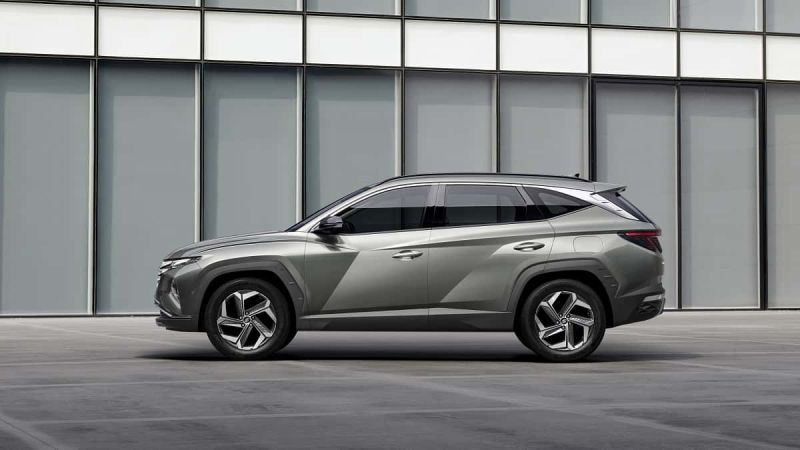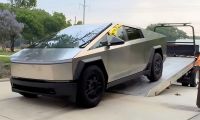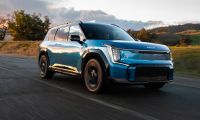The Mitsubishi Outlander was the first modern plug-in hybrid-electric (PHEV) two-row crossover with AWD. We liked the Outlander PHEV when it debuted, but it has been overshadowed by the outstanding new 2021 Toyota RAV4 Prime PHEV. As green crossovers become all the rage, we expected others to join the mix, but Honda opted to only add a hybrid CR-V trim without a plug. To our surprise, it will be Hyundai that jumps in next.
The 2022 Hyundai Tucson has just been revealed, but we don't have all of the details yet. What we do know is that Hyundai will offer both hybrid, and plug-in hybrid trims and that there will be two wheelbases, so perhpas there will be a longer option for the PHEV.
“We are thrilled to introduce the all-new Tucson, the latest model in Hyundai’s SUV transformation,” said Thomas Schemera, Executive Vice President, Head of Product Division at Hyundai Motor Group. “This exciting vehicle sets a new benchmark for innovation in its segment, delivering an impressive blend of design, technology, packaging and performance.”
We are not sure what new benchmarks have been set by Hyundai. Toyota's new RAV4 Prime has 302 hp and a 94 MPGe fuel economy rating. It can run from 0-60 MPH in under six seconds and travel for 42 miles (which we confirmed) on battery power alone with the AC blasting. The Toyota RAV4 Prime has set the present benchmarks in the segment, and they will be tough to top.
What we do know is that Hyundai's international press release included this statement on the drivetrains: "The 1.6-liter hybrid powertrain produces an estimated 180 PS, with a combined powertrain output of 230 PS. It also produces 195 lb.-ft. of torque from the gasoline engine and 258 lb.-ft. of torque from the combined hybrid powertrain. This new powertrain uses Continuously Variable Valve Duration (CVVD) technology that manages valve opening duration for optimal power, efficiency and emissions with minimized compromise." PS units of power are equivalent to 98% of HP.
So, it seems like the Tucson is bringing a knife to a gunfight in the segment. On the other hand, torque counts more than HP, and perhaps Hyundai's new Tucson, still at least a full year away from sale in the U.S., could top the RAV4 Prime for range and efficiency. Without a battery size it is not possible to predict that.
We hope that the new Tucson resets the benchmarks just established by the Toyota RAV4 Prime this summer. In one way, it definitely will. Hyundai reports that the new Tucson crossover will have ambient mood lighting that is adjustable to 64 colors in 10 levels of brightness.
John Goreham is a long-time New England Motor Press Association member and recovering engineer. John's focus areas are technology, safety, and green vehicles. In the 1990s, he was part of a team that built a solar-electric vehicle from scratch. His was the role of battery thermal control designer. For 20 years he applied his engineering and sales talents in the high tech world and published numerous articles in technical journals such as Chemical Processing Magazine. In 2008 he retired from that career to chase his dream of being an auto writer. In addition to Torque News, John's work has appeared in print in dozens of American newspapers and he provides reviews to many vehicle shopping sites. You can follow John on Twitter, and view his credentials at Linkedin
Hover mouse over image to see photo credits
Set as google preferred source












Comments
The blazing acceleration of
Permalink
The blazing acceleration of the RAV4 Prime is nice but many who are looking for PHEV qualities are not looking for speed. They want range.
Yeah, I get that the performance aspect will be a secret desire of many but I do like the idea of the turbo 1.6 liter engine for efficiency.
I have tested the 1.6 turbo
Permalink
In reply to The blazing acceleration of by Mark (not verified)
I have tested the 1.6 turbo in the Tucson, Elantra GT Sport, Elantra GT, and Veloster Turbo. In every case I loved it. Gutsy and efficient. This could be a great new green crossover.
I love my rav4 prime. I
Permalink
I love my rav4 prime. I prefer a 2.5 N/A over a 1.6t for reliability. Anyway it has been proved that it's as efficient as a smaller displacement turbo in the real world.
I've been expecting Hyundai,
Permalink
I've been expecting Hyundai, Honda, and Ford to have a near answer to the RAV4 Prime. Their answers may be good enough for some people who don't want to wait for Toyota to crank up RAV4 Prime production, but I'll wait for the RAV4 Prime unless Toyota decides to make an equally impressive Prime sedan. I'd prefer a Lexus ES Prime, Toyota. Get with the program!
The RAV4 Prime is a great
Permalink
The RAV4 Prime is a great design, but it is hampered by two things. First is availability, with only 5,000 being built. And second is cost. $38K seems reasonable for the bare bones, base model. Especially with federal subsidies dropping the net price. But at least here, local dealers are adding a $5K premium, putting the RAV4 Prime around $52K-$56K before subsidies, which is close to the price of the Tesla Model Y Long Range. Just looking at Toyota's own pricing of the Prius Prime, it costs $3500 more than the regular Prius, as opposed to $10K difference between the RAV4 Hybrid and the Prime models (not counting subsidies). I've driven the current Tucson, and it was a great little crossover. Nothing earth shaking, but it surprised me in a good way. The next model as a PHEV looks like it will be better in every way. I figure that the Tucson PHEV will a closer competitor to the Ford Escape PHEV and upcoming revised Outlander PHEV. But Nissan will debut their Ariya BEV around the same time, and the base price may be close enough to consider a rival.
Well said. What I like most
Permalink
In reply to The RAV4 Prime is a great by DeanMcManis (not verified)
Well said. What I like most about the Ariya is that it is to be AWD. My conversations with Toyota employees have never confirmed the "5,000" limitation on the production of the RAV4 Prime. I have a hunch that if the federal EV tax incentives are extended, and the cap increased for manufacturers to use them, perhaps in January, that the U.S. will see a lot more EV availability in the country. If not, the top-selling RAV4 Hybrid will likely continue to be produced and sold in the low five-figures per month for quite some time.
Rav4 Prime seems great on
Permalink
Rav4 Prime seems great on paper, but the reality of the EV part in California doesn't make sense financially. For one, charging out and about will be expensive, and not even close to comparable to the hybrid version of Rav4. The chargers around me charge anywhere from $1.50 to $2.50 an hour to charge. If you have the fastest charging Rav4 Prime, it will cost you about $7 to $3.75 to charge your Rav4 Prime and that's just to go 40+ miles. Gas is $3 / gallon now, and the Rav4 Hybrid does nearly 40 mpg combined on 1 gallon of gas. Some places charge $0.20 / kwh, which for the 15 kwh portion of the EV battery pack, costs $3. Again, not anything different from just gas. Finally, charging at home with PGE's EV rate plans, it costs nearly $0.20 / kwh when you factor in the taxes, and other charges into the $0.15 / kwh base rate.
No matter how you slice or dice it, the PHEV's don't make sense in a place like California where electricity is expensive, the LVL2 charging infrastructure is crap and super expensive, and not only that, you have to sit around for hours to charge it.
Most people charge at home.
Permalink
Most people charge at home. If you must charge out in the world, many shopping centers have free charging as do city offices. Our library has 4 free L2 stations.
If it costs you $3 to charge for 40 miles or range you have scarcely lost anything.
You did lose something. You
Permalink
In reply to Most people charge at home. by Mark (not verified)
You did lose something. You lost time. 4.5 hours of it in the SE trim, 2.5 hours in the XSE premium. No one has time to sit around 3 hours to charge at a library.
Finally, I did more cost calculations with PGE, and once you include taxes, and other fees in the pricing, the $0.15 / kwh is closer to 0.20 / kwh. That's about $3 to charge at home to go 40+ miles. Compared to the regular Rav4 Hybrid, it's not exactly that much better with gas being around $3/gal nowadays.
Solar definitely makes it more cost competitive, though, to gas.
MSG, I'm guessing that you
Permalink
MSG, I'm guessing that you have never owned a plug in hybrid before. I've had 4 of them, and the reality is that most people will never use public charging, simply because you don't have to. You charge up overnight at home automatically, and if you figure $0.15/kWh, and about 12kW for 40 miles, that's under $2 for 40 miles. Gas is nowhere near that cheap here. Plus if you have solar, the power used is rolled into your overall household electricity cost which is minimal. The key point is with a plug-in hybrid, you totally have the option of gas or EV operation. For me, on longer trips I run gas because the gas generator is very efficient at highway speeds (40MPG+) and then I switch back to EV mode for the city streets. For shorter trips (which is most of the time) the PHEV is essentially a BEV, running fully on electricity. Plus because the car is running mostly on electricity, the gas engine is barely used, so after driving thousands of miles it's almost brand new. And because the generator reclaims energy from braking it saves the brakes as well. Like all transportation, it is not a perfect solution, but in reality it works very well.
Woah Im really digging the…
Permalink
Woah Im really digging the template/theme of this website. Its simple yet effective. A lot of times its very hard to get that perfect balance between user friendliness and visual appearance. I must say that youve done a very good job with this. Additionally the blog loads very quick for me on Firefox. Exceptional Blog